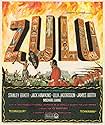VALUTAZIONE IMDb
7,7/10
43.748
LA TUA VALUTAZIONE
Soldati britannici in inferiorità numerica combattono con i guerrieri Zulu a Rorke's Drift.Soldati britannici in inferiorità numerica combattono con i guerrieri Zulu a Rorke's Drift.Soldati britannici in inferiorità numerica combattono con i guerrieri Zulu a Rorke's Drift.
- Nominato ai 1 BAFTA Award
- 1 candidatura in totale
Trama
Lo sapevi?
- QuizOne of this movie's technical advisors was a Zulu Princess, and the tribe's historian. She knew the battle strategy perfectly, and drew it on the sand. Director Cy Endfield shot it exactly as she drew it.
- BlooperSeveral Zulu warriors wear wrist watches.
- Citazioni
Pvt. Cole: Why is it us? Why us?
Colour Sergeant Bourne: Because we're here, lad. Nobody else. Just us.
- Curiosità sui creditiAt the end of the opening credits 'and Introducing Michael Caine' is shown, this would suggest that this was his first film. In fact MC had previously had five credited film roles, numerous TV appearances and several uncredited film roles before appearing in Zulu.
- ConnessioniEdited into Wizards (1977)
- Colonne sonoreMen of Harlech
(uncredited)
Traditional
Performed by soldiers
Recensione in evidenza
A stirring, inspiring film about ordinary British soldiers, caught off-guard and forced to fight for their lives.
During the Victorian period, discipline within the British Army was at its very peak, and the Officers were well versed in standard military manoeuvres. However, Lord Chelmsford, leading the colony out of ISLANDWANA, effectively sealed the fate of the 1000 or so Soldiers encamped on the slopes of the mountain at Islandwana, and in turn forced the Mission station at Rourkes Drift into a seemingly impossible situation; Beat off the attack.
Luckily, Lt John Chard of the Royal Engineers had been assigned to Rourkes Drift to "Build a Bridge", thus saving him from massacre and lending his wisdom and sharp military mind to the ragged bunch of soldiers at the station.
Lt Gonville Bromhead, superbly played by Michael Caine, epitomised the "Military Families" that had been commanding regiments for Decades during the 18th and 19th Centuries.
The film speaks for itself, culminating in the final, mesmerising, breath-taking, desperate battle to hold fast against a disciplined attack from the ZULU impi.
Strangely, the film makes no mention of Cetsewayo's order that no force should attack any entrenched British position. The Rourkes Drift attack was spearheaded by one of his headstrong sons, eager to prove his courage and leadership skills to his respected warrior father.
With narration from none other than Richard Burton, stirring music, the pre-battle singing at dawn, and the three level firing lines on a "mealy-bag" redoubt, you can't do better than "ZULU".
During the Victorian period, discipline within the British Army was at its very peak, and the Officers were well versed in standard military manoeuvres. However, Lord Chelmsford, leading the colony out of ISLANDWANA, effectively sealed the fate of the 1000 or so Soldiers encamped on the slopes of the mountain at Islandwana, and in turn forced the Mission station at Rourkes Drift into a seemingly impossible situation; Beat off the attack.
Luckily, Lt John Chard of the Royal Engineers had been assigned to Rourkes Drift to "Build a Bridge", thus saving him from massacre and lending his wisdom and sharp military mind to the ragged bunch of soldiers at the station.
Lt Gonville Bromhead, superbly played by Michael Caine, epitomised the "Military Families" that had been commanding regiments for Decades during the 18th and 19th Centuries.
The film speaks for itself, culminating in the final, mesmerising, breath-taking, desperate battle to hold fast against a disciplined attack from the ZULU impi.
Strangely, the film makes no mention of Cetsewayo's order that no force should attack any entrenched British position. The Rourkes Drift attack was spearheaded by one of his headstrong sons, eager to prove his courage and leadership skills to his respected warrior father.
With narration from none other than Richard Burton, stirring music, the pre-battle singing at dawn, and the three level firing lines on a "mealy-bag" redoubt, you can't do better than "ZULU".
- Stevebarry2000
- 1 dic 1999
- Permalink
I più visti
Accedi per valutare e creare un elenco di titoli salvati per ottenere consigli personalizzati
Dettagli
- Data di uscita
- Paese di origine
- Lingue
- Celebre anche come
- Zulu - Die Schlacht von Rorke's Drift
- Luoghi delle riprese
- Azienda produttrice
- Vedi altri crediti dell’azienda su IMDbPro
Botteghino
- Budget
- 1.720.000 USD (previsto)
- Tempo di esecuzione2 ore 18 minuti
Contribuisci a questa pagina
Suggerisci una modifica o aggiungi i contenuti mancanti









































